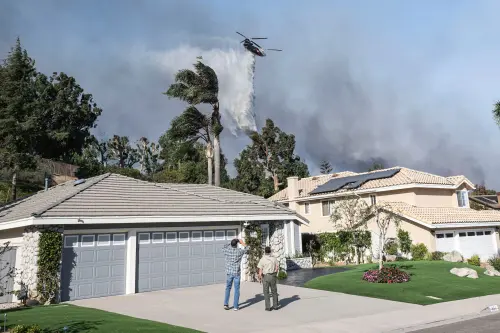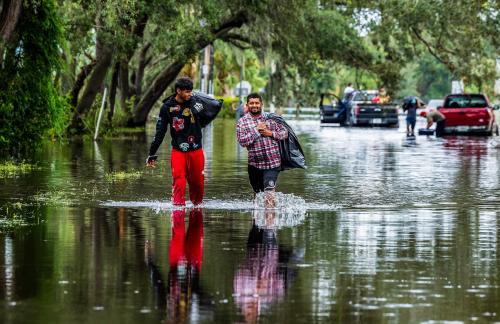This month, California wildfires displaced tens of thousands of people and caused an estimated economic loss of $250 billion. As the climate grows increasingly inhospitable, we must rethink how to provide for Americans’ economic well-being. Right now, economic security is like a landline phone: tied to your home or workplace. We need to make it more like a cell phone: accessible wherever you are.
The United States has long encouraged homeownership as a primary pathway to personal wealth accumulation. As of 2024, about 66% of American households are homeowners. The median wealth of American households was $166,900 in 2021; when excluding home equity, that value drops by about two-thirds, to $57,900. But climate change makes homes a less reliable store of wealth, not just because climate disasters destroy homes, but because climate risk raises insurance costs and lowers home values. In some high-risk areas, insurers have simply stopped renewing coverage, leaving homeowners one hurricane or wildfire away from losing most of their savings.
The system of homeownership being destabilized by climate change was already in need of fundamental reform. Historically, federal housing programs segregated neighborhoods and prevented Black applicants from accessing the financing available to white applicants, leaving Black and Hispanic families with much lower rates of homeownership. Our colleague Andre Perry has demonstrated that Black neighborhoods continue to be undervalued. As Princeton professor Keeanga-Yamahtta Taylor writes, “there has not been an instance in the last 100 years when the housing market has operated fairly, without racial discrimination.” White families received 121% of the average 2019 Home Mortgage Interest Deduction tax benefit, while Black families received 54% and Hispanic families received 38%.
As we have written previously, housing inequities are likely to be exacerbated by climate change. Black and Hispanic communities have disproportionately high exposure to climate risk on average while deriving a greater percentage of their wealth from home equity. And, as others have noted, the role that property values play in wealth accumulation incentivizes homeowners to treat homeownership as a zero-sum game, opposing new building in their neighborhoods and contributing to the national housing shortage. In communities incorporating climate migrants, unwillingness to build new housing will be especially damaging.
Like the economic security of homeownership, the economic security provided by place-based public and private benefits will be challenged by climate migration. Eligibility requirements and generosity of unemployment insurance, nutrition assistance, and other social protections depend on what state you live in. Private benefits like health insurance often tie workers to places through “job lock.” Reapplying for benefits in a new area places administrative burdens on climate migrants who are already dealing with the challenges of relocation, and, as Hurricane Katrina demonstrated, patchwork state programs can struggle to effectively administer benefits after mass displacement. As the U.S. population shifts in response to the changing climate, our geography-based system of economic security will struggle to meet Americans’ needs.
Consider in contrast portable and near-universal programs like Social Security and Medicare. These programs reduce place-based challenges to economic security; regardless of where a person moves, they will receive their benefits. Social Security and Medicare are much more racially equitable than regressive spending like the home mortgage interest deduction. In fact, the programs reduce racial disparities in wealth and healthcare access. The structure of Social Security also encourages political participation. As the political scientist Andrea Louise Campbell has documented, the program dramatically increased the political mobilization of elders by providing them with money, time, and a direct interest in politics. Unlike homeownership, the programs do not incentivize people to use their political power to protect their own assets at the expense of others—they create a cross-class alliance of people with a shared interest in maintaining their benefits.
Broadening portable social welfare benefits is therefore a critical component of the response to climate migration. Social insurance already constitutes an underappreciated part of disaster recovery that helps communities compensate for the economic effects of disasters. Expanding these programs would help mitigate the unequal costs borne by marginalized people facing climate displacement. A robust system of social welfare benefits also helps ensure that marginalized communities are empowered to participate in decisions on how to respond to climate change.
No set of policies will eliminate the devastating consequences of climate change, and addressing those consequences must include an energy transition from fossil fuels to renewable energy. But expansive portable benefits can protect the basic material needs of individuals and communities harmed by the climate crisis. Designing these benefits is no small task and will require careful research. A central principle guiding this research must be a reconsideration of old assumptions about place-based economic security. Federal social insurance programs, not homeowner subsidies, provide a model for Americans’ economic security in a time of increasing mobility on a warming planet.
The Brookings Institution is committed to quality, independence, and impact.
We are supported by a diverse array of funders. In line with our values and policies, each Brookings publication represents the sole views of its author(s).









Commentary
Rethinking place-based economic security in the age of climate migration
January 31, 2025